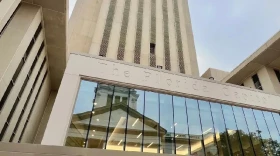State education officials are slated next week to approve a proposed rule that would require Florida’s public colleges to have supplies of emergency opioid antagonists, such as naloxone, in residence halls and dormitories.
The proposal stems from a 2023 bill (HB 783) approved by the Legislature and Gov. Ron DeSantis. Opioid antagonists are used to treat people who overdose by counteracting “the life-threatening depression of the central nervous system and respiratory system that results from an opioid overdose,” a House analysis of the bill said.
Under the proposal, which could get final approval from the State Board of Education during a meeting Wednesday, college housing would be required to have injectable or intranasal opioid antagonists in clearly marked locations.
“Public and private partnerships are encouraged to cover the cost associated with the purchase and placement of such emergency opioid antagonists. Institutions will not charge students a fee for receiving such emergency opioid antagonists supplied by funding from the Opioid Settlement Trust Fund,” part of the proposed rule says.
The trust fund was set up with money paid to the state in a settlement with opioid distributors, manufacturers and dispensers.




